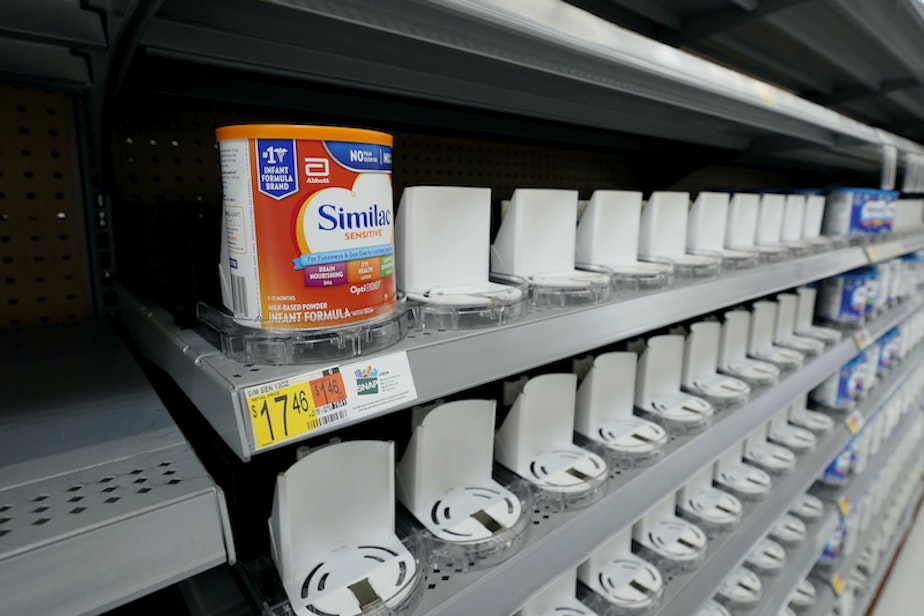'All I want to do is feed my baby': The struggle facing parents of babies who need specialized formula

Alisha Harris is a nail technician who lives in Mill Creek, near Everett. About two weeks ago, she had only a can and a half left of the specialized formula her baby girl Mahaliyah needs. That was enough to last about a week and a half. She knew formula was in short supply, so she started looking for more.
That search turned out to be grueling. She spent an hour or two a day driving to grocery stores and checking shelves. Because she didn’t have child care, she had her 4-year-old and 7-month-old in tow.
“I am overwhelmed and don’t know how I’m going to do this,” Harris said. “All I want to do is feed my baby. That’s all I want to do.”
It’s a nationwide problem that’s affecting parents all over Washington state. Just one factory makes the vast majority of the specialized baby formula in the US — and that factory was closed to address unsafe bacterial contamination. Now, it’s next to impossible to find specialized formulas.
Mahaliyah needs a specialized formula because she was born two months early, at only 2 pounds, 9 ounces. She had to spend more than a month in the hospital before she could go home, and, even after she was discharged, she still needed a specific baby formula high in calories and other nutrients so she could keep gaining weight.
On Monday, Alisha Harris had only enough formula left to last through Tuesday night — one more day. So she drove as far south as Puyallup looking for more.
Sponsored
“I’m way up north, but I drove south just to see if I could find anything,” she said. “Couldn’t find anything. I called my mom and I just cried. I was like, ‘My baby’s going to starve.’”
Eliza Lagerquist, a dietician at UW Medical Center – Montlake, works with babies born prematurely. She said parents who are in this situation should buy any formula they can find.
“A safe formula, even if it’s not the ideal formula, is our goal,” she said. “Fed is always best.”
In other words, it is generally okay for parents to substitute regular formula for specialized formula if needed -- unless, of course, the infant has an allergy.
Lagerquist said families should always call their doctor’s office to let them know they can’t find the recommended formula. She said pediatric nutritionists and dieticians can help advise how to mix regular formula to make it as close as possible to what a specific baby needs, or can let families know if it isn't safe in their case to make a substitution.
Sponsored
Regular formula is also in short supply right now, but families can generally find some, even if they have to switch brands. Lagerquist said it’s important that families buy no more than a couple weeks' worth, because hoarding could make the situation worse for everyone.
As for Alisha Harris, she ended up calling her doctor’s office, and she said her doctor told her, “At this point, just get your hands on whatever you can find. … We just want to make sure [Mahaliyah]’s fed.”
So Harris and her partner went out and found some cans of regular formula, “which was sweet relief, ’cause I was so stressed out,” Harris said.
For those who want to help local parents, they can join Facebook groups where people are sharing intel about which stores have formula available, and even offering to buy that formula and bring it to families that need it. And breastfeeding moms who happen to have an oversupply can donate milk to milk banks, which can help ease the demand for regular formula.




